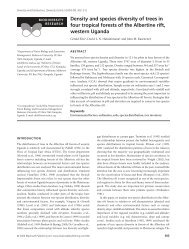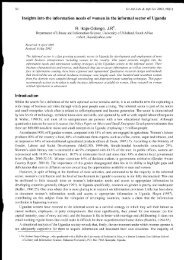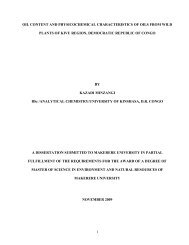THE UNIVERSITY OF LEIPZIG
THE UNIVERSITY OF LEIPZIG
THE UNIVERSITY OF LEIPZIG
Create successful ePaper yourself
Turn your PDF publications into a flip-book with our unique Google optimized e-Paper software.
concluding the ceremonies with the intercession of the spirits that was done by a spiritual<br />
leader. These ceremonies involved the ritual performances in forest sacred places. If the<br />
deceased was a wealthy or influential man, a big tree would be uprooted and the deceased<br />
would be buried there. Nowadays, the mourners stay for shorter periods of time (about one<br />
week) and the celebrations are held at the time of burial, with a single closing ceremony again<br />
to end the forty days. The Luhya believe in animisms/spirits. Sacrifices are made to please the<br />
spirits. These traditons are also tied to the birth of first born children. For instance elaborate<br />
ceremonies are carried out during festivals to mark the first born’s birthday. Different animals<br />
species were always involved in these elaborate ceremonies. Such animal would kiss the new<br />
born as a sign of blessing and good health to the new child. Different animals are used by<br />
different clans and such animals were later released back to the forest while others were<br />
domesticated in the respective homes. 627<br />
The family<br />
Luhya culture revolves around the extended family. Polygamy is allowed it is a traditional<br />
norm. Today, however, polygamy is seen to be declining in some parts of Luhya land. About<br />
10-15 families traditionally make up a village, headed by a village headman (Omukasa or<br />
Oweliguru ) who is elected by the male population in the village. In many cases, the village<br />
chief is also a medicine man and healer within a family. 628 Among the men, the man of the<br />
home was the ultimate authority, followed by his first-born son. In a polygamous family, the<br />
first wife held the most prestigious position among women. The first-born son of the first wife<br />
was usually the main heir to his father, even if he happens to be younger than his half-brothers<br />
from his father's other wives. Daughters have virtually no permanent position in Luhya<br />
families. They were viewed as other men's future wives, and are brought up to fulfil this role.<br />
They do not inherit property, especially customary land, and are excluded from decisionmaking<br />
meetings within the family. Children are named after the clan's ancestors, animal<br />
species, grandparents, or after events or the weather. The paternal grandparents take<br />
precedence, so that the first born son will usually be named after his paternal grandfather<br />
(kuka), while the first born daughter will be named after her paternal grandmother (kukhu).<br />
Subsequent children may be named after maternal grandparents, after significant events, or<br />
even after the weather. For example, the name "Wafula" among the Bukusu is given to a boy<br />
born during the rainy season. This comes from the Bukusu word for rain, "efula" and Simiyu<br />
among the Banyala was the name given to the child born during the dry season.<br />
627 Focus Group Discussion 12 July 2006.<br />
628 Middleton, J and G.Kershew. 1965. Ethnographic Survey of East and Central Africa. London: International<br />
African Institute.<br />
143






